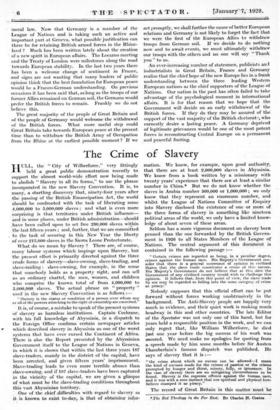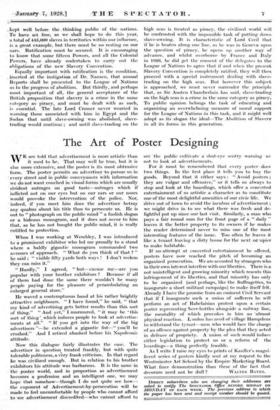The Crime
of Slavery HULLHULL, the " City of Wilberforce," very fittingly , a great public demonstration recently to support the almost world-wide effort now being made to abolish " Slavery in all its forms," to use the phrase incorporated in the new Slavery Convention. It is, to many, a startling discovery that, ninety-four years after the passing of the British Emancipation Act, the world should be confronted with the task of liberating some 4,000,000 to 5,000,000 slaves . and what is even more surprising is that territories under British influence— and in some places, under British administration—should ,have been called upon to set free 280,000 slaves within the last fifteen years ; and, further, that we are committed to the task of securing in this New Year the liberty of over 215,000 slaves in the Sierra Leone Protectorate.
What do we mean by Slavery ? There are, of course, many labour systems which impinge upon Slavery, but the present effort is primarily directed against the three crude forms of slavery—slave-owning, slave-trading, and slave-raiding : slave-owning, for example, in the sense that somebody holds as a property right, and can sell as an ordinary chattel, the men, women, and children who comprise the known total of from 4,000,000 to 5,000,000 slaves. The actual phrase on " property " used in the new Slavery Convention is as follows :- "Slavery is the status or condition of a person over whom any
or all of the powers attaching to the right of ownership are exercised.'
It is, of course, a mistake to speak of the present systems of slavery as harmless institutions. Captain Cochrane, with his full knowledge of Abyssinia, in a dispatch to the Foreign Office confirms certain newspaper articles ••• which described slavery in Abyssinia as one of the worst systems that have ever cursed the Continent of Africa. There is also the Report presented by the Abyssinian Government itself to the League of Nations in Geneva, in which it is shown that within the last three years 187 slave-traders, mainly in the district of the capital, have been arrested, and given fifteen years' imprisonment. Slave-trading leads to even more terrible abuses than slave-owning, and if 187 slave-traders have been captured in the vicinity of the capital, we are given a glimpse of what must be the slave-trading conditions throughout this vast Abyssinian territory. - . One of the chief difficulties with regard to slavery as it is known to exist to-day, is that of obtaining infor- mation. We know, for example, upon good authority, that there are at least 2,000,000 slaves in Abyssinia. We know from a book written by a missionary with twenty years' experience that there are at least a similar number in China.* But we do not know whether the slaves in Arabia number 500,000 or 1,000,000 ; we only know. that they represent an enormous number, and whilst the League of Nations Committee of Enquiry into Slavery disclosed the existence of one or more of the three forms of slavery in something like nineteen political areas of the world, we only have a limited know- ledge of about seven of these areas.
Seldom has a more vigorous document on slavery been penned than the one forwarded by the British Govern- ment in 1926 to all States Members of the _League of central Nations. The ntral argument of this document is contained in the following passage :— " Certain crimes are regarded as being, in a peculiar degree, crimes against the human race. His Majesty's Government con- sider that there is a general consensus of opinion in civilized States that the slave trade constitutes a crime of this nature. His Majesty's Government do not' believe that at this date the Government of any civilized country would wish to challenge this opinion. It follows that, from this point of view, the slave trade by sea may be regarded as falling into the same category of crime as piracy."
Nobody supposes that this official effort can be put forward without forces working unobtrusively in the background. The Anti-Slavery people are happily very much in evidence, and their quiet work is making much headway in this and other countries. The late Editor of the Spectator was not only one of this band, but for .years held a responsible position in the work, and we can only regret that, like William Wilberforce, he died just one year before the big success of his work was assured. We need make no apologies for quoting from a. speech made by him some months before Sir Austen Chamberlain's famous dispatch was published. He says of slavery that it is :— the crime about which no excuse can be allowed—I mean the kind of excuses made for the crimes of passion or the crimes
i prompted by hunger and thirst, misery, folly, or ignorance. In the case of slavery there are no mitigating circumstances to be found. Slavery is the supreme offence against the human race, and it was with a sure instinct that our spiritual and physical fore- fathers stamped it as piracy."
The record 'of Great Britain- in this matter must be !!The Reel Theology in the Far East. Br Charles H. Coates kept well before the -thinking public of the • nations. To have set free, as we shall. hope to do this year, a total of 445,000 slaves in territories within our influence, is a great example, but there must be no resting on our • oars. Ratification must be secured. It is encouraging . to know that some fifteen Powers, and all the Colonial Powers, have already undertaken to carry out the obligations of the new Slavery Convention.
Equally important with ratification is the condition, inserted at the instigation of Dr. Nansen, that annual Reports shall be presented to the League of Nations as to the progress of abolition. But thirdly, and perhaps most important of all, . the general acceptance of the . British proposition that slavery is a crime in the same category as piracy, and .must be dealt with as such, is essential. The late Lord Cromer never wearied in warning those associated with him in Egypt and the Sudan that until slave-owning was abolished, slave- trading would continue ; and until slave-trading on the --high seas is treated as piracy, the civilized world will be confronted with the impossible task of putting down slave-owning. It is characteristic of Lord Cecil that if he is beaten along one line, as he was in Geneva upon the question of -piracy, he opens up another way of advance, and whilst overborne by France and Italy in 1926, he did get the consent of the delegates to the League of Nations to agree that if and when the present Slavery Convention is completely ratified, they will then prodeed with a special instrument dealing with slave- trading on the high seas. But however this subject is approached, we must never surrender the principle that, as Sir Austen Chamberlain has said, slave-trading on the high seas is a crime in the same category as piracy. To public opinion belongs the task of educating and organizing an overwhelming measure of moral support for the League of Nations in this task, and it might well adopt as its slogan the ideal—The Abolition of SlaVery in all its forms in this generation.







































 Previous page
Previous page